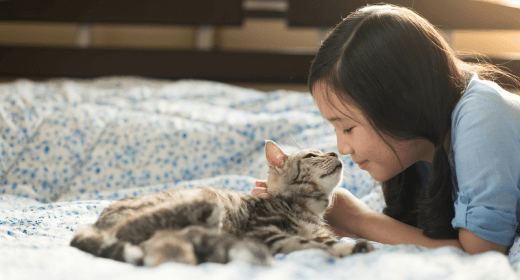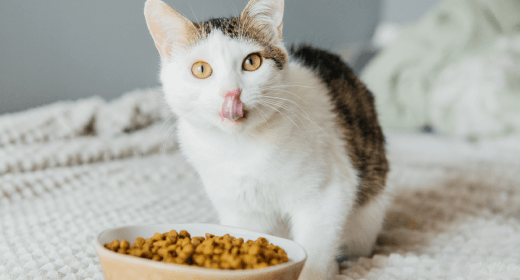

The average cat’s lifespan is around 15 years. While a cat’s lifespan indoors can range from 12 to 18 years, some pet cats even live for up to 20 years. Outdoor cats lead significantly riskier lives as they are more prone to accidents and being attacked by other outdoor animals. Moreover, they often cannot receive medical attention in cases of ailments or injuries. This leads to them have a shorter life expectancy in comparison to their indoor counterparts.
As a pet parent, you would want your fur baby to live a long and healthy life. It’s common sense that feeding your cat a high-quality diet has its benefits. But when it comes to maximizing your cat’s lifespan, diet is only part of the equation. Read up on everything you need to do to ensure your cat lives happily for a long time to come.
A cat’s age span is divided into six stages. To understand how you can maximise your cat’s life expectancy, it is necessary to understand these life stages.
From birth till 6 months, the cats are in their earliest years and are called ‘kittens’. They undergo quick development during this time and require a lot of nutrients.
From 6 months to 2 years of age, cats are considered ‘juniors’. During this time, they reach sexual maturity and develop a personality. When your cat is about a year old, they can be switched from kitten food to adult cat food.
Between the age of 3 to 6 years, cats are considered to have reached their ‘prime’ age. They will be in their best physical condition during this time. However, do make sure that you still take your cat to the vet for regular check-ups.
Cats are considered to be in their ‘mature’ life stage between 7 to 10 years of age. During this time, they might become less active. This might even cause them to put on some extra weight, so you may have to make changes to their diet. You may also have to add some extra vitamins to meals to improve immunity. This will be an important step in maximizing cat life expectancy.
Between 11 to 14 years of age, cats are considered seniors and are at a higher risk of catching an illness. Ensure that you make regular visits to the vet and consult them frequently to ensure that your fur baby is not missing out on nutrition.
At the age of 15 years or higher, cats are at the ‘geriatric’ life stage. During this time, they may remain mostly inactive and need more attention.
Here is a brief guide to explain what the average age of cats is in human years:
When a cat turns 2 years of age, it is considered equivalent to a human turning 24 years old.
After a cat turns 2, each following year in their life amounts to 4 human years. So, when a cat is 3 years old, it amounts to 28 human years; when 4 years old, it amounts to 32 human years, and so on.
Knowing what affects your pet’s lifespan can help you take the right steps to prolong longevity.
Let’s start with something you do every day: feed your cat. There are several healthy options to choose from, so we’ll help you zero in on the formula that’s best for your cat. It’s important to note that cats are natural carnivores. Therefore, a formula with meat as the primary ingredient is a great place to start. Meat as a protein source has certain nutrients, such as taurine, that non-meat protein sources simply do not. Also, along with a proper diet, ensure your cat stays hydrated.
Regular visits to the veterinarian can help nip health issues in the bud. For instance, a vet will be able to tell if your cat is gaining too much weight and can recommend a diet and fitness program to get your kitty back to a healthy size.
You may even want to bring a fresh faecal sample along to your next appointment. Your vet can use this sample to search for ringworms. This tip can save you extra trips to the vet’s office in case your cat does not cooperate, so to speak, during their appointment.
Also, vets provide your cat with the vaccinations they need to fight off diseases such as feline rabies. Some vaccinations are required annually, while others should be administered every three years. Your vet’s office can help you keep track of it all, so remember to schedule that appointment!
Your cat relies on you for more than just healthy food and fresh water. They need stimulation. Sure, cats love their independence, but let’s be honest, they love getting attention. By playing with your cat for even 10 to 15 minutes a day, you are doing wonders for their lifespan. Some great games to play don’t even require fancy toys. Get a piece of string and tie it around a clean sock, then yank the string whenever your cat comes in close to investigate. Voila! Instant fun!
Cats don’t go on runs as dogs do, so keeping your cat active with games and toys is the best way to help keep them fit. About 30 minutes of exercise or playing in a day is enough to have a significantly positive impact on maximizing your cat’s lifespan.
If your pet’s teeth are left unclean, they can develop plaque and tartar which can cause severe problems like pain, tooth loss, or kidney ailments. So, ensure that you take your cat for regular dental check-ups.
Follow these tips and your cat will be on her way to a long and happy life with you. You’re a great owner for taking the time to read this article. It shows how much you really care about her. Now step away from the computer and show your cat some attention!


Ethoxyquin is a synthetic antioxidant (artificially manufactured from other elements) that is approved for various uses. It is approved and regulated by the Food and Drug Administration (FDA) and the Association of American Feed Control Officials (AAFCO) for use as a preservative in animal feeds. Pet food manufacturers have been using ethoxyquin to prevent rancidity and maintain the nutritional quality of their products for more than 35 years.
Ethoxyquin remains stable at the high temperatures required to process pet foods during extrusion. It is important in protecting fats and oils from degrading, losing available calories, and becoming rancid.
Despite the fact that all studies conducted to date prove that ethoxyquin is safe for use in all animal foods when used at approved levels, rumors continue to circulate to the contrary.
Individuals who seek to discredit the use of ethoxyquin will often cite certain studies that showed toxic effects in animals fed ethoxyquin. What these individuals fail to point out is that the animals in these studies were given excessive amounts of ethoxyquin—20 to more than 50 times the maximum limit—before negative effects were exhibited.